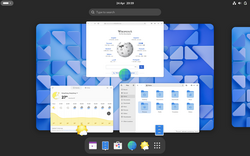
Back GNOME Afrikaans GNOME ALS GNOME ANG جنوم Arabic GNOME AST GNOME Azerbaijani GNOME BAR GNOME Bulgarian গানোম Bengali/Bangla GNOME BS
 | |
 | |
| Original author(s) | Miguel de Icaza and Federico Mena |
|---|---|
| Developer(s) | GNOME Project |
| Initial release | 3 March 1999[1] |
| Stable release | 48.1[2] |
| Repository | |
| Written in | C, XML, C++, C#, HTML, Vala, Python, JavaScript, CSS, Rust, Perl[3] |
| Operating system | Linux and other Unix-like systems |
| Platform | Wayland and X11 |
| Available in | 38 languages[4] |
| Type | Desktop environment |
| License | GPL-2.0-or-later[5] |
| Website | www |
GNOME (/ɡəˈnoʊm/, /ˈnoʊm/)[6][7][8][a] is a free and open-source desktop environment for Linux and other Unix-like[10] operating systems.
Many major Linux distributions, including Debian, Fedora Linux, Ubuntu, Red Hat Enterprise Linux, and SUSE Linux Enterprise distribute GNOME as their default desktop environment; it is also the default in Oracle Solaris, a Unix operating system.
GNOME is developed by the GNOME Project, which is composed of both volunteers and paid contributors, the largest corporate contributor being Red Hat.[11][12][13] It is an international project that aims to develop frameworks for software development, to program end-user applications based on these frameworks, and to coordinate efforts for the internationalization, localization, and accessibility of that software.
In 2023/2024, GNOME received 1 million Euros from Germany's Sovereign Tech Fund.[14]
- ^ "GNOME 1.0 Released" (Press release). San Jose, California: GNOME Project. 3 March 1999. Archived from the original on 8 December 2021. Retrieved 11 January 2016.
- ^ "GNOME 48.1 released". 17 April 2025. Retrieved 23 April 2025.
- ^ "Programming Languages".
- ^ "Introducing GNOME 41". Archived from the original on 22 December 2021. Retrieved 20 December 2021.
- ^ "GNOME License". Archived from the original on 7 November 2017. Retrieved 8 December 2017.
- ^ Sandler, Karen (26 March 2014). "Introducing GNOME 3.12". GNOME Project (video). YouTube. Archived from the original on 21 December 2021. Retrieved 2 July 2014.
- ^ Clinton, Jason (2 April 2011). "GNOME 3: Fewer interruptions". GNOME Project (video). YouTube. Archived from the original on 21 December 2021. Retrieved 7 April 2011.
- ^ "How do I pronounce GNOME?". Massachusetts Institute of Technology. Archived from the original on 13 September 2022. Retrieved 13 September 2022.
Since GNU is GNOME's first name, GNOME is officially pronounced "guh-NOME". However, many people pronounce GNOME as just "NOME" (like those short people from legend), nobody will hurt you if you find this pronunciation easier.
- ^ Cite error: The named reference
:3was invoked but never defined (see the help page). - ^ Clasen, Matthias (19 February 2014). "On portability". Goings on. Archived from the original on 2 March 2014. Retrieved 30 June 2022.
- ^ Neary, Dave; David, Vanessa (2010), The GNOME Census: Who writes GNOME? (PDF), Neary Consulting, archived (PDF) from the original on 23 June 2016, retrieved 15 June 2016
- ^ "Staring into the abyss". Swfblag. Gnome. 27 July 2012. Archived from the original on 31 July 2012. Retrieved 15 March 2014.
- ^ "GNOME at 25: A Health Checkup – Et tu, Cthulhu". 7 August 2022. Archived from the original on 11 January 2023. Retrieved 7 August 2022.
- ^ "GNOME". Sovereign Tech Fund. Retrieved 27 April 2025.
Cite error: There are <ref group=lower-alpha> tags or {{efn}} templates on this page, but the references will not show without a {{reflist|group=lower-alpha}} template or {{notelist}} template (see the help page).
© MMXXIII Rich X Search. We shall prevail. All rights reserved. Rich X Search